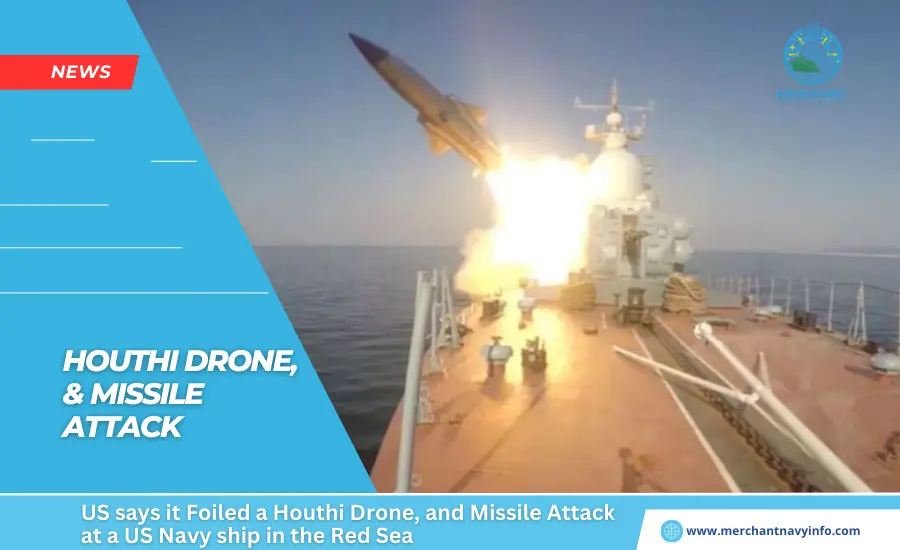
- Houthi drone destroyed. US Central Command stated the US Navy destroyer USS Gravely destroyed one ballistic missile and two drones aimed at it on Tuesday
- CENTCOM forces also took out a mobile surface-to-air missile system in a secret Yemeni location controlled by Houthis
AL-MUKALLA: The US military said it destroyed on Wednesday two drones and one ballistic missile. These were fired by Yemen’s Houthi forces against a US Navy ship in the Red Sea. Additionally, decimated a Houthi missile on Yemeni soil.
This is the latest in a wave of Houthi missile and drone hits against US Navy ships. Moreover, as retaliatory US and British action on Houthi-dominated areas of Yemen.
The US Central Command said the US Navy destroyer USS Gravely intercepted one ballistic missile and two drones aimed at it on Tuesday, causing no injury or property damage to the ship or international commercial ships passing through the Red Sea.
Centcom Destroyed a Surface-to-air Missile System
“It was determined these systems presented a threat to US and coalition forces. Also, merchant vessels in the region,” CENTCOM said.
Since January, the US and UK have launched strikes on Sanaa, Saada, Hodeidah, and other Houthi-controlled areas of Yemen. This has been in response to Houthi missile and drone attacks on ships in the Red Sea. It is vital to protect the Bab Al-Mandab Strait and the Gulf of Aden.
The Houthis say that their hundreds of attacks on ships are solely aimed at Israel-linked and Israel-bound ships. Moreover, it is in an attempt to push Israel to let humanitarian supplies into the Palestinian Gaza Strip.
This comes as the Houthis have not claimed responsibility for any new attacks on international shipping routes off Yemen’s coasts since March 26, despite repeated reports from CENTCOM about drones and missiles being destroyed, as well as other notices from UK marine agencies about incidents in the Red Sea.
US military commanders reported a decrease in the number of Houthi strikes on commercial and navy ships in the Red Sea, compared to swarms of drones and missiles fired by the Houthis during the early days of their Red Sea ship campaign, which began in November.
Houthi drone attacks slowing down
Speaking to reporters on Wednesday, Lt. Gen. Alexus Grynkewich, top US Air Force commander for the Middle East, attributed the slowdown in attacks to the militia exhausting their arsenal of drones and missiles, as well as strikes by the US-led marine coalition that weakened the Houthi military capabilities.
He said the US does not know how many drones and missiles the Houthis still have. Furthermore, it is looking into how Iran would resupply weapons to the Houthis. “The challenge for us is understanding what the denominator was at the beginning. We obviously know how much we have struck. Also, we have assessments of how successful those strikes were,” the US commander said, the Associated Press reported.
Meanwhile, the US and EU have condemned the Houthis for releasing a new 100-riyal coin currency. This is being rolled out in areas under their control, warning that the move will exacerbate Yemen’s economic divisions and humanitarian crisis.
The US Embassy in Yemen expressed support for the internationally recognized central bank in Aden’s efforts to stabilize the country’s financial sector, accusing the Houthis of further dividing Yemen’s economy, jeopardizing the integrity of its banking sector, and undermining its commitment to global regulations to combat terrorism funding.
“The United States condemns the issuance by the Houthis — a designated global terrorist group — of counterfeit coins to replace Yemen’s legitimate currency. Counterfeit coins must not be further introduced into the gmarket,” the embassy stated on X.
EU concerned about Houthi drones
The EU has also expressed concern that the Houthis issuing a new coin would weaken the country’s financial sector. In addition, its financial engagements with foreign monetary funds express support for Aden’s central bank and its governor, Ahmed Ghaleb.
“Unilateral decisions that risk deepening the fragmentation of Yemen’s economy. Further undermine the banking sector and the country’s compliance with international AML-CTF standards. Such do not help the cause of peace or the well-being of Yemenis,” it said in a statement.









